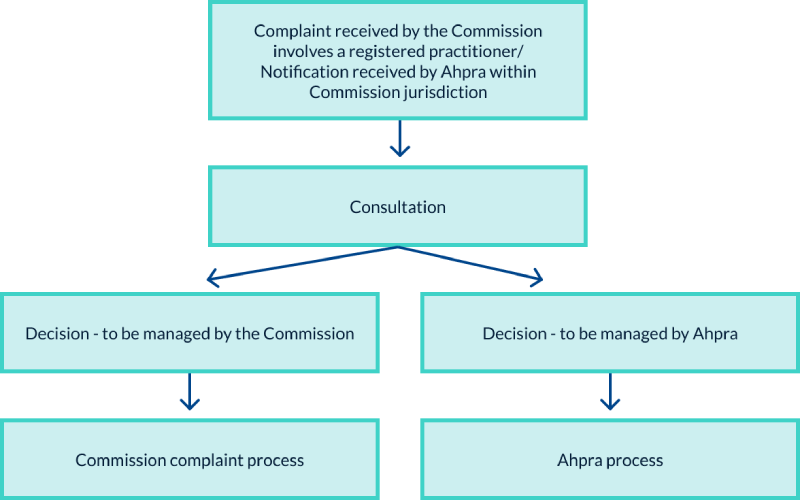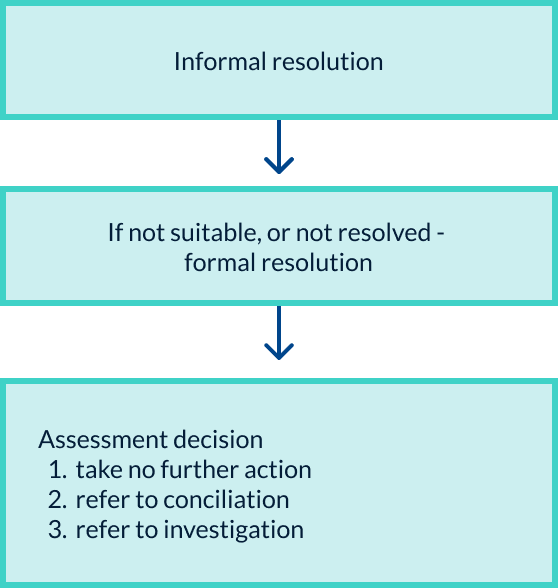The Commission handles complaints about providers of health, disability and aged care services in the Northern Territory. Our goal is to help parties to a complaint resolve that complaint whenever possible.
Information can be found on this page about:
The Commissioner is required to notify the National Board of any complaint which involves an individual health practitioner who is registered with that National Board. In practice, the Commissioner notifies the Australian Health Practitioner Regulation Agency (Ahpra), which works with the 15 National Boards to help protect the public by regulating Australia’s registered health practitioners.
Ahpra is also required to notify the Commissioner of any complaints or notifications it receives which fall within the Commission’s jurisdiction.
The two agencies then consult to determine which agency, the Commission or Ahpra, is best suited to manage the complaint or notification. If a decision is made at consultation that the matter is more appropriately handled by the Commission, the Commission’s complaint process begins.
Commission/Ahpra Consultation

We consider whether the person making the complaint has already tried to resolve it directly with their health service provider, because this is often the quickest and easiest way to resolve an issue. It also helps to maintain important relationships between the service user and their service provider.
When complaints are resolved this way, there is no need for further intervention from the Commission.
Information about how service users might approach their service provide with a concern can be found here. Information for service providers is available here.
If the complaint is not suitable for resolution between the service user and service provider, or if attempts to resolve the complaint this way are not successful, the Commission will work with parties to try to resolve the complaint.
The majority of complaints received by the Commission are managed informally. In most cases, this involves discussing the complaint with both parties over the phone, or via email communication. Sometimes all that is required to manage a complaint is the provision of further information. On other occasions, a complaint may be referred to another agency which is better suited to manage it.
A formal letter is sent to the service provider setting out the complaint issues and providing a copy of the complaint. The service provider is asked to respond to the complaint issues, answer any further questions asked by the assessing officer, and provide any documents or additional evidence required. The service provider response is then provided to the person making the complaint (unless there are reasons for withholding this information). When preparing their response, service providers are asked to consider how their response might resolve the complaint, for example by providing an explanation of the circumstances which led to the complaint. The Commission will continue to work with parties to resolve the complaint while it is being assessed.
The Commission has 60 days from receipt of the complaint to make one of the following decisions:
- Take no further action
- Refer the complaint to conciliation
- Refer the complaint to investigation
- Refer the complaint to a National Board or some other body
Commission Complaint Process

The Commissioner may decide to take no further action in approximately 60% of complaints which are formally assessed. Reasons for taking no further action include that:
- Further investigation is unnecessary or unjustified;
- The complaint is resolved;
- Civil proceedings have commenced;
- The person making the complaint has not provided further information when asked to do so; or
- The complaint has been withdrawn.
Conciliation is a formal complaints resolution process, suitable for complaints which involve serious or complex issues. It is voluntary. All discussions and documents produced during conciliation are privileged and confidential. This means they cannot be discussed outside the conciliation and cannot be used in any future legal proceedings.
A complaint may be referred to investigation only if the complaint, or a pattern of complaints, appears to raise a significant concern about the practices and procedures of the service provider; or if it appears to raise a significant issue of public health or safety or public interest. The Commission has wide powers during an investigation, including the power to require persons to attend to give evidence in person, and to require service providers to provide documents requested by the Commission.
When its investigation is complete, the Commission may propose remedies or make recommendations which are set out in a report. A copy of the finalised report is provided to the service provider and may be provided to the complainant and other relevant bodies.